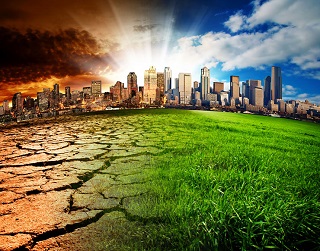Scorching Hot Day for the 2017 Climate March in Washington D.C.

Though the temperature in the nation’s capital (91F) didn’t set a record, it came close. If you’re looking for heat records, though, note that Pakistan hit 122F earlier in the week. Yes, it gets hot in Pakistan; their record temperature was set in 2010 at 128F. But 122 in April? Unprecedented.
As he promised his supporters, the U.S. president has forwarded an energy policy that further enriches his friends in Big Oil by opening up federal lands to the exploration of coal, natural gas and oil, while ripping apart regulations on oil drilling in the Atlantic Ocean and the waters off Alaska.
It’s hard to believe that Trump, or anyone else who has access to people of science, legitimately believes that climate change is a hoax. It’s much more likely that he knows exactly what is about to ensue for the 7.4 billion of us here on the Home Planet, but, like so many of his kind, simply don’t care.
Following Marie Antoinette, Trump seems to be saying, “Let them bake.” Mr. President: How did that work out for Marie?

Craig,
Well considering Marie Antoinette never actually said “let them eat cake !”, it would appear that having started with an old urban myth, you continue to build a new and equally inaccurate myth !
( Jean-Jacques Rousseau included the pâté story in his “Confessions” in 1766, attributing the words to The quote originates from Jean-Jacques Rousseau “Confessions” published in 1766, at that time Marie-Antoinette was only 9 years old ! The “a great princess” Rousseau cited was probably Marie-Thérèse.)
Excitable reports in the media verify nothing, nor does quoting isolated and dubious measurements, out of context.
If anything, by confusing weather events and anomalies as “proof’ of immediate Global warming or Climate Change, is unhelpful since such reports are easily debunked adding to a lack of creditably and increasing support for skeptics.
Overly excitable utterances provide excellent fodder for publications such as ‘Wattsupwiththat ?’, who able to use such material effectively.
An example of this is the recent article; [https://wattsupwiththat.com/2017/04/27/oops-warmists-just-lost-the-antarctic-peninsula-it-is-now-cooling/
The article uses new data form highly respected sources to not only prove the inaccuracy of the famous “Nature Magazine” atricle, but reveals the disingenuous methods and manipulations of scientific data employed in the article, which at the time had great influence.
Short-lived publicity gains, bought at the expense of credibility reduces support to a decreasing(but shriller)band of marginalized “true believers”.
Credibility is too hard to gain to waste on such silly nonsense.
I had heard that the “Let them eat cake” reference was apocryphal. Thanks for that story, though I think there’s a point to be made whether or not those words were actually spoken.
Please see: http://www.2greenenergy.com/2017/04/30/climate-deniers-2/
Here is more about Marie Antoinette:
http://www.history.com/news/ask-history/did-marie-antoinette-really-say-let-them-eat-cake
Here is a quotation from the above:
“But did Marie-Antoinette really say those infuriating words? Not according to historians. Lady Antonia Fraser, author of a biography of the French queen, believes the quote would have been highly uncharacteristic of Marie-Antoinette, an intelligent woman who donated generously to charitable causes and, despite her own undeniably lavish lifestyle, displayed sensitivity towards the poor population of France.
“That aside, what’s even more convincing is the fact that the ‘Let them eat cake’ story had been floating around for years before 1789. It was first told in a slightly different form about Marie-Thérèse, the Spanish princess who married King Louis XIV in 1660. She allegedly suggested that the French people eat “la croûte de pâté” (or the crust of the pâté). Over the next century, several other 18th-century royals were also blamed for the remark, including two aunts of Louis XVI. Most famously, the philosopher Jean-Jacques Rousseau included the pâté story in his ‘Confessions’ in 1766, attributing the words to ‘a great princess’ (probably Marie-Thérèse). Whoever uttered those unforgettable words, it was almost certainly not Marie-Antoinette, who at the time Rousseau was writing was only 10 years old—three years away from marrying the French prince and eight years from becoming queen.”
It’s too bad that she is constantly demonized for something she never did.